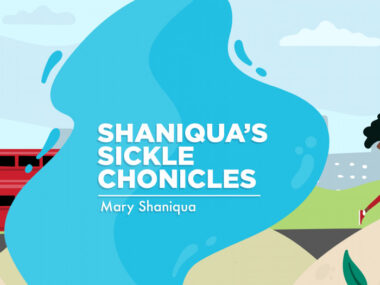How pharmacists can play a role in sickle cell disease advocacy
A recent event gave me hope for improvements in care, quality of life
Written by |

I was recently invited to attend a pharmaceutical networking event that focused on sickle cell disease.
The event was hosted by Black Pharma, a nonprofit organization that promotes greater representation of Black professionals across the pharmaceutical industry. It was co-organized by the Sickle Cell Society, a U.K.-based charity that supports people with the disease. Attendees had in-depth discussions about sickle cell disease awareness and advocacy, as well as the ways sickle cell and pharmaceutical services intersect.
Numerous pharmaceutical professionals and sickle cell community members willingly gave up their evenings to come together to learn more about the disease. Many topics were covered, including the current political landscape for sickle cell patients, the importance of clinical trials, pharmaceutical initiatives that have reaped dividends for our community, and areas where improvements are required if patients are to experience an increased quality of life.
I’ve written previously about my dream to see greater community care services for sickle cell patients so that we aren’t forced to go to the hospital for every aspect of our care. For this vision to become a reality, I believe there’s an opportunity for community pharmacists to be more proactive in their dealings with sickle cell patients. For example, I’d love for patients to know that pharmacists are available to support us when we encounter difficulty accessing medications, require referrals for further medical intervention, or need professional advice and guidance.
So it was promising to see that many pharmaceutical professionals desire to do more and make a positive impact in our lives.
Sickle cell patients need a safe space
At the event, I raised my concerns that stigmas and bias result in many sickle cell patients being erroneously considered drug-seekers. (Many of us have zero desire to become drug-dependent!) Unfortunately, sickle cell patients in the U.K. don’t currently have a safe space to seek out professional help if we do start noticing signs of dependency.
For example, opioid usage can, in some cases, cause an extreme sensitivity to pain, known as hyperalgesia. If I were to experience this, where should I turn? Should I approach a general practitioner who’s unfamiliar with my condition and hasn’t been able to help me in the past? Should I approach hospital staff, some of whom may judge me for being a “drug-seeker”? Presuming I do go to the emergency room and request pain relief, what are the real-life implications for me? Can I be certain that hospital staff would treat me, rather than withholding medication because of how they’ve judged me?
The reality is that none of these questions can be answered with the certainty I require as a patient who experiences debilitating pain. If I were to notice signs of dependency, I don’t feel I have a safe space to talk about it with a medical professional.
My vision of greater community care for sickle cell patients involves pharmacists stepping in to fill this void.
Finding allies in the pharmaceutical industry
At present, this void aids in a detrimental, self-fulfilling prophecy for sickle cell patients: Even if we identify a problem with drug dependency, there is nowhere we can turn to for help, meaning the dependency is likely to continue. Fighting a battle against brain chemistry is no easy feat — something I suspect anybody familiar with the disease of addiction could attest to. This issue needs to be addressed in a way that preserves the safety and well-being of patients.
Though we have a long way to go before this becomes a reality, I felt extremely encouraged after attending the event. It highlighted to me that we patients are not alone in our fight. We have allies who are proactively using their personal time to learn more about the disease and patients’ needs. These allies aim to use their professional positions to bring about change in the pharmaceutical industry and the sickle cell community.
This was a particularly timely reminder for me, as I recently learned that the National Institute for Health and Care Excellence has preliminarily recommended that the gene therapy Casgevy (exagamglogene autotemcel) not be reimbursed for sickle cell patients via the U.K.’s National Health Service. Hearing this kind of disheartening news can make it feel as though no one outside of the sickle cell community is interested in improving our well-being and quality of life.
Through it all, I choose optimism. I try to remain hopeful that improvements to sickle cell patients’ daily lives are on the way.
Note: Sickle Cell Disease News is strictly a news and information website about the disease. It does not provide medical advice, diagnosis, or treatment. This content is not intended to be a substitute for professional medical advice, diagnosis, or treatment. Always seek the advice of your physician or other qualified health provider with any questions you may have regarding a medical condition. Never disregard professional medical advice or delay in seeking it because of something you have read on this website. The opinions expressed in this column are not those of Sickle Cell Disease News or its parent company, Bionews, and are intended to spark discussion about issues pertaining to sickle cell disease.



Leave a comment
Fill in the required fields to post. Your email address will not be published.